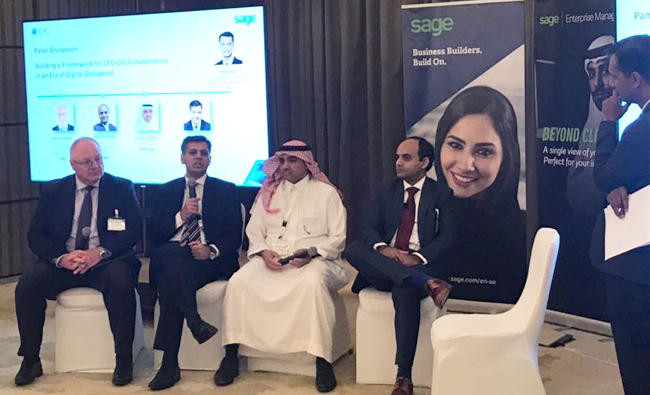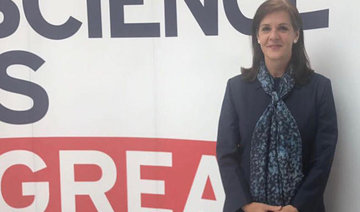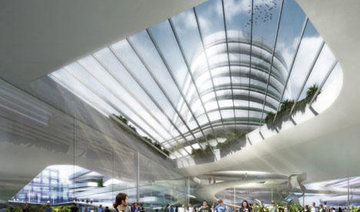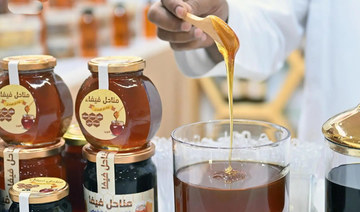RIYADH: The top senior executives in Saudi business must work together in close coordination to better understand each other’s priorities in the current disruptive digital environment, said
Matthew Kibby, Vice President Enterprise, Africa and Middle East atthe Sage, a British multinational enterprise software company headquartered in Newcastle upon Tyne.
Digital disruption is the change that occurs when new digital technologies and business models affect the value proposition of existing goods and services.
Kibby was speaking at a round table hosted here on Wednesday by the Sage Middle East in collaboration with leading industry analyst firm IDC to discuss best practices that bridge the increasingly interrelated functions of the Chief Financial Officers (CFOs) and Chief
Investment Officers (CIOs) as organizations ramp up the adoption of digital technologies
in the Kingdom Under Saudi Vision 2030.
Significantly, digital transformation is a key pillar of the Vision 2030, the national transformation road-map to reform and diversify Saudi economy, and develop various other sectors including health, construction, tourism and education. The event titled the “CFO-CIO Exchange: Building a framework for CFO-CIO collaboration in an era of digital disruption”, explored how technologies impact the CFO’s function, and how CIOs must increasingly collaborate with CFOs to develop business cases for the quick adoption of new technologies.
Speaking at the opening session Kibby said, "Saudi’s grand reform plan targeting the post-oil age will drive digital disruption and technological evolution for all industries in the Kingdom."
" As such, it is imperative that C-Suite business leaders understand and appreciate each other’s business priorities," he said said adding, " the finance function has to embrace digital transformation through big data and artificial intelligence (AI)."
Notably, C-Suite business leader refers to the seniors who get names from the titles of top executives which tend to start with the letter C for chief, as in Chief Executive Officer (CEO), Chief Financial Officer (CFO), Chief Operating Officer (COO), and Chief Information Officer (CIO).
Later speaking to Arab News on their priority and role in line with Vision 2030, Kibby said, " a key priority for us at Sage is to equip enterprises with smarter business software solutions, capable of intuitively helping organizations boost productivity and make better decisions based on
real-time data."
"For us it is very important that we have a valuable market presence in Saudi Arabia, we have a number of customers in the region, we really want to make sure that we are aligned with Saudi Vision 2030 that technology is going to assist in the achievements of local businesses with digital
transformation playing key role in national transformation program," he added.
He further pointed that there is a log list of new technologies which various organizations have started specializing in such as mobility, cloud computing, the internet of things (IoT), robotics, these types of technologies have started to become more and more mainstream and organizations started to impress with these technologies especially what they can deliver to reach expectations in line with Vision 2030.
He added that CFO holds the budget and is basically a business leader and CIO takes the technology decisions, they need to have a collaborative engagement model to the benefit of the organizations, which we are focusing on, it will also be helpful in parting the age gap as well as technology gap between the CFOs and CIOs.
In the second session there was a presentation on the newly introduced value-added tax (VAT), its implementation in the Kingdom and the impact it has had on businesses and industries in the GCC region.
Speaking about VAT and its business implications, Mansoor Sarwar, Director for Technical Services and Pre-Sales, Sage Middle East, said, " the GCC region is still in early stages
of the VAT regime, with only Saudi Arabia and the United Arab Emirates (UAE) having implemented it this year.
The fresh introduction of duties in a region totally unfamiliar with taxes have been a challenge for CFOs, who need to balance performance, efficiency and risk, he added. Aligned with the digital transformation of the economy, CFOs should look to joint decision-making with CIOs, and use digital tools that can help automate most of the VAT process and drive productivity, he noted.
Later Kibby and Sarwar were joined by Ranjit Rajan, Associate Vice President for Research at IDC Middle East, Turkey and Africa, Moazam A Shah, CFO, Al Zamil Group and Hassan Al-Bahes, Chairman of the Institute of Management (IMA,Riyadh Chapter) in a panel that discussed best practices for CFOs and CIOs that align their functions and drive excellence in performance.
Rajan, who earlier made a presentation on navigating digital transformation, moderated the
panel discussion.
The event was attended by about 100 business executives representing various industries.
Sage is the market and technology leader for integrated cloud accounting, payroll, and payment systems, supporting the ambition of entrepreneurs and business builders.
Saudi business heads must coordinate in disruptive digital environment, says tech leader
Saudi business heads must coordinate in disruptive digital environment, says tech leader

Scheme to ‘humanize’ pilgrim services during Hajj season

- Scheme focuses on taking care of the sick, the elderly, and people with disabilities who are visiting the Grand Mosque and the Prophet’s Mosque
RIYADH: The Presidency of Religious Affairs of the Grand Mosque and the Prophet’s Mosque recently launched the Humanitarians (Ensaniyoun) initiative as part of the 2024 Hajj season, the Saudi Press Agency reported.
The scheme aims to enrich the experience of pilgrims by humanizing the services provided by the presidency. It focuses on taking care of the sick, the elderly, and people with disabilities who are visiting the Grand Mosque and the Prophet’s Mosque, creating an appropriate worship environment for them.
Sheikh Dr. Abdul Rahman Al-Sudais, head of Religious Affairs at the Grand Mosque and the Prophet’s Mosque, said: “The Humanitarians initiative aims to enhance behavior and humanize the services provided by the presidency across its various sectors and departments ... creating an appropriate worship environment for pilgrims, and facilitating their access to religious services without effort or hardship.”
The initiative encourages specialization among employees and the use of flexible technology and digitization to meet religious needs, Al-Sudais said.
He added: “This commitment to humanitarian responsibility, amid the extensive religious work in the Two Holy Mosques and their global outreach, reflects the belief that balanced institutional giving leads to human and global success stories. By maintaining this balance, we achieve success in the rituals of Hajj and in serving pilgrims.”
The Humanitarians initiative aligns with the Kingdom’s Vision 2030 by enhancing the religious and humanitarian services provided to pilgrims.
Saudi Reef program provides $37.3m of support to Kingdom’s honey industry

- Sustainable Agricultural Rural Development Program celebrates World Bee Day by highlighting its achievements in its support of the sector
- Honey production in the Kingdom reached 3,120 tons last year; aim is to produce 7,500 tons a year by 2026 and become self-sufficient
RIYADH: About SR140 million ($37.3 million) in funding for the honey industry in the Kingdom has helped 10,584 beneficiaries since 2020, the Saudi Press Agency reported.
The recipients of the support, provided by Saudi Arabia’s Sustainable Agricultural Rural Development Program, also known as Saudi Reef, come from all parts of the country but the program said those in Asir, Hail, Makkah and Al-Baha regions benefited the most.
Saudi Reef marked World Bee Day on Monday by highlighting its notable achievements so far in supporting the local honey industry. It said production in the Kingdom reached 3,120 tons in 2023, a 41 percent increase compared with 2021, and the aim is to increase annual production to 7,500 tons by 2026 and achieve self-sufficiency.
The program said it has supported several projects vital to the sector, including the establishment of queen bee rearing and package bee production facilities in areas such as Hail, Najran, Jazan, Medina, Tabuk and Taif.
It also supplies modern beekeeping tools and spreads awareness of the latest techniques, and has set up three mobile laboratories to investigate and diagnose bee diseases and pests, along with four mobile clinics.
The program said it remains committed to providing support for beekeepers and implementing projects that benefit the honey industry, in keeping with efforts to achieve sustainable and comprehensive development in the Kingdom.
Saudi Reef aims to support environmental sustainability and diversification of the agricultural production base in the Kingdom, by aiding the development of rural communities and efforts to achieve food security.
It added that its projects provide job opportunities, help improve incomes and standards of living for small farmers, and enhance agricultural capabilities in keeping with the objectives of the Saudi Vision 2030 development and diversification plan.
Japan, Saudi Arabia FMs agree to work closely

- Prince Faisal said he was keen to collaborate with Tokyo
- Kamikawa expressed her sincere wishes for the early recovery of Saudi Arabia’s King Salman
TOKYO: Japan’s Foreign Minister Kamikawa Yoko said on Monday she hopes to work closely with Prince Faisal bin Farhan, her Saudi counterpart, on the multiple crises the world is currently facing, such as the situations in Gaza and Ukraine.
In a telephone call, Prince Faisal said he was keen to collaborate with Tokyo to allow the foreign minister to make an official visit to the Kingdom in the near future, and that he looks forward to working with Kamikawa toward stabilizing the situation in the region.
In response, Kamikawa expressed her sincere wishes for the early recovery of Saudi Arabia’s King Salman and stated that Japan attaches great importance to its strategic partnership with the Kingdom and seeks to work closely with Prince Faisal.
Saudi Arabia restricts Umrah permits to Hajj permit holders

- New regulation aims to manage influx during peak pilgrimage period from May 24 to June 26
- The ministry stated that Umrah permits will not be issued to individuals without a confirmed Hajj permit
RIYADH: Saudi Arabia’s Ministry of Hajj and Umrah has announced that starting May 24 until June 26, Umrah permits will only be issued to those with a confirmed Hajj permit.
The directive was issued by the ministry to facilitate Hajj pilgrims arriving in Saudi Arabia from around the world, ensuring their pilgrimage at the Grand Mosque in Makkah is conducted with ease and comfort.
The ministry stated that Umrah permits will not be issued to individuals without a confirmed Hajj permit.
This measure aims to manage the influx of pilgrims in the holy city during the busy Hajj season, ensuring a smooth experience for all pilgrims.
The Ministry of Hajj and Umrah posted on X: “Defying Hajj regulations will result in severe and unwavering penalties. A fine of SR10,000 ($2,666) will be imposed on individuals caught in Makkah and the holy sites without a Hajj permit, applicable to citizens, residents, and visitors. The fine will double for repeat offenders, and resident violators face deportation and a ban from entering Saudi Arabia.”

Earlier, the Ministry of Interior announced penalties for those who violated Hajj regulations and instructions, such as those found without a permit in Makkah, the central region, the holy sites, the Haramain train station in Rusayfah, security control centers, sorting centers, and temporary security control centers. These will be effective from June 2 to June 20.
Any citizens, residents or visitors caught within the specified restricted areas without a Hajj permit will be fined SR10,000. In addition, residents face deportation to their home country and a ban from entering the Kingdom for a stipulated period.

Emphasizing the importance of adherence to Hajj regulations and instructions, the ministry stressed that the fine would be doubled for repeat offenders.
Transporting individuals without a permit is a serious offense, with penalties of up to six months in prison and a fine of up to SR50,000. The fine will increase proportionately with the number of people carried. The means of transportation will be seized and expatriate transporters will face deportation and a ban from re-entering the Kingdom for a specified period.
Members of the public are urged to report anyone breaking the rules by calling (911) in Makkah, Riyadh and the Eastern Province, and (999) in the remaining regions.
One of the five pillars of Islam, this year’s Hajj is expected to run from June 14 to June 19.
Pilgrim mobility innovation contest concludes in Makkah

- Event aimed to enhance pilgrim services in innovative ways, focusing on assisting people with disabilities in completing Hajj rituals like Tawaf and Sa’i
RIYADH: The General Authority for the Affairs of the Grand Mosque and the Prophet’s Mosque, along with Umm Al-Qura University and Wadi Makkah Co., recently concluded the pilgrim-mobility enhancement challenge at the university’s headquarters in Makkah.
The one-week event, which started on May 12, aimed to enhance pilgrim services in innovative ways, focusing on assisting people with disabilities in completing Hajj rituals like Tawaf and Sa’i.
It featured four categories: Manual wheelchairs, electric vehicles, golf carts and trailers, alongside an open section for creative mobility ideas.
With 50 teams and 190 participants, the challenge also involved 19 mentors, 10 judges and 118 mentoring sessions.
During the closing ceremony, attended by Umm Al-Qura University President Dr. Moaddi bin Mohammed Aal Madhhab, and the CEO of the general authority, Ghazi bin Dhafer Al-Shahrani, an exhibition showcased contributions and innovative ideas from organizing bodies and participating teams.
Dr. Ammar Attar, adviser to the general authority, highlighted the importance of forging quality partnerships, citing Umm Al-Qura University as a pioneer in Hajj and Umrah sciences and technologies. He lauded the joint initiative to enhance Tawaf and Sa’i mobility as a significant outcome of this collaboration.
Dr. Ali Al-Shaeri, CEO of Wadi Makkah Co., praised the challenge’s success and impact, highlighting its role in the university’s broader innovation program to enhance the pilgrim experience through effective partnership with the general authority.
Majed Al-Fuwaiz, secretary-general of the National Council for Occupational Safety and Health, applauded the challenge for fostering innovation to create a safe and appealing working environment meeting both local and international safety standards for those serving pilgrims.
The ceremony concluded with the honoring of the winners: Masari team claimed first place for their development of a smart path system for electric carts; Maseer team secured second place with AI-powered carts designed for ergonomic comfort; Naqiloon team earned third place for their Tawaf trailers tailored for specific location needs; Tarrayath team took fourth place for their sensor-based device safeguarding pilgrims in the Grand Mosque; and Mu’een team clinched fifth place with an app connecting pilgrims to cart drivers within the Two Holy Mosques.
Targeting postgraduate students, university students, faculty members, international students and entrepreneurs, the challenge aimed to enhance the mobility experience for Tawaf and Sa’i.
Participants delved deeper into the challenge through field visits and interactions with service providers, leading to the practical application of their ideas.


















